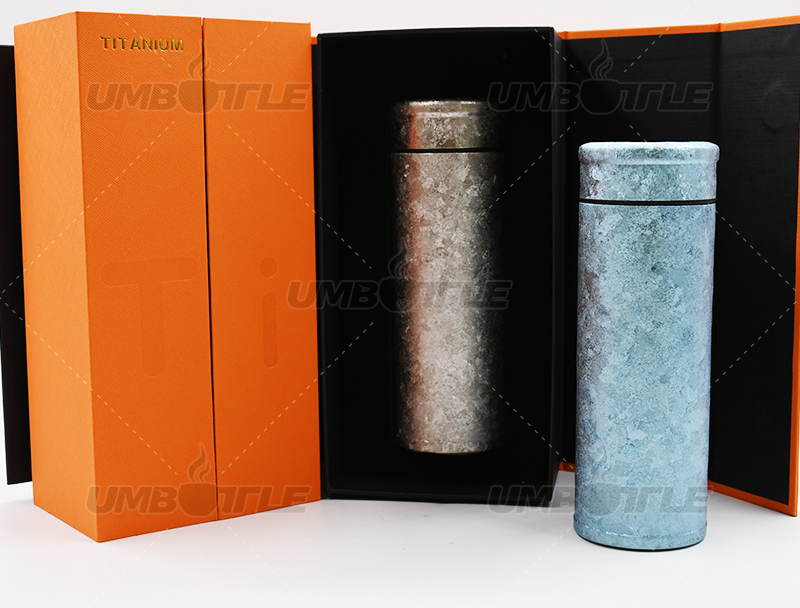Stainless Steel VS Titanium: What's the Difference in Thermal Cups? — Q&A Edition
There are stories in every cup, and warmth in every life. Hello everyone, and welcome to "Dong Dong's Cup Talk" It’s been a while since I last shared knowledge about cups with you all. Today, I’m going to talk about the differences between stainless steel thermal cups and titanium thermal cups. https://www.umbottle.com/ProductsDetail-VB-10486.htmlAs always, before we dive in, don’t forget to give this video a thumbs-up after watching. If you’re worried about missing out on my future updates, feel free to follow me so you won’t miss any of my content. I take every share seriously, and since there’s a lot to cover this time, I’ll break it down into several parts as usual.
5. Top 10 Consumer Questions (Answered by an Engineer)
Q: How can you tell the quality of a thermal cup’s material at a glance?
- Stainless Steel: Check if the inner wall of the rim is seamless (prevents leaks and stains).
- Titanium Cup: Gently scratch a hidden spot with a key. https://www.umbottle.com/ProductsDetail-VB-10486.htmlIf it reveals a silver-white base, it’s genuine titanium.
Q: Which is better, 304 or 316 stainless steel?
- 304 is sufficient for daily water/tea use. For coffee/juice/milk or coastal users, https://www.umbottle.com/ProductsDetail-VB-10486.html316 offers better corrosion resistance.
Q: Are titanium cups less insulating than stainless steel? Are they worth buying?
- The difference is about 5%, but titanium’s extreme lightness, unmatched corrosion resistance, and zero odor make it ideal for premium users, outdoor enthusiasts, https://www.umbottle.com/ProductsDetail-VB-10486.htmland those with sensitivities.
Q: How should I clean and maintain them?
- Stainless Steel: Avoid prolonged exposure to acidic liquids; clean promptly to prevent stains/oxidation. Use diluted white vinegar to remove scale.
- Titanium Cup: Do NOT use steel wool! For stubborn stains, https://www.umbottle.com/ProductsDetail-VB-10486.htmluse a sponge and baking soda. Ensure it’s completely dry before long-term storage (prevents water spots).
Q: What’s their actual lifespan?
- Stainless Steel: 5-8 years with normal use (the sealing ring usually wears out first).
- Titanium Cup: Theoretically over 20 years (e.g., titanium cups used by Antarctic expeditions since 1998 are still in service). https://www.umbottle.com/ProductsDetail-VB-10486.htmlActual lifespan depends on seals (typically 10+ years).
Q: Does the lid material matter?
- Absolutely! Low-quality plastics can release BPA when heated. Look for food-grade PP or Tritan lids (clearer and more impact-resistant).
Q: If the vacuum seal dot (small round mark) falls off, does it lose insulation?
- No! That’s just the sealing mark from vacuuming. https://www.umbottle.com/ProductsDetail-VB-10486.htmlThe insulation layer remains intact. But if the dot is visibly dented or rusty, be cautious.
Q: How can I test insulation performance?
- DIY test: Fill with 95°C hot water. If the temperature stays ≥65°C after 6 hours, it’s qualified; ≥75°C is excellent.
Q: Why don’t titanium cups have inner coatings?
- Don’t gild the lily! https://www.umbottle.com/ProductsDetail-VB-10486.htmlTitanium’s inherent safety surpasses all coatings. Peeling coatings could pose risks.
Q: Which offers the best value for money?
- For affordability and reliability: Choose reputable Chinese brands’ 316 stainless steel cups (¥150-250).
- For the ultimate experience: https://www.umbottle.com/ProductsDetail-VB-10486.htmlInvest in a reliable TA1 pure titanium cup (avoid “titanium alloy” gimmicks).
Stainless steel thermal cups are like dependable family cars—economical, durable, and mature in technology. Titanium thermal cups are the lightweight supercars—top performance with a premium price. Your choice ultimately depends on your needs and budget. https://www.umbottle.com/ProductsDetail-VB-10486.htmlMay this practical comparison help you cut through the marketing hype and find the perfect cup for you.
Engineer’s advice: Stay away from no-name products! Whether stainless steel or titanium, always look for the GB 4806.9 food-contact material standard. https://www.umbottle.com/ProductsDetail-VB-10486.htmlYour health is always worth the investment.

There are stories in the cup, and life has warmth. Choose a good factory to sell good water cups. We provide global OEM services for patented products and provide global OEM services with professional teams and high quality standards. Dongguan Zhan Yi Commodity Technology Co.,Ltd. specializes in high-quality cup and kettle products. We are willing to serve you wholeheartedly.